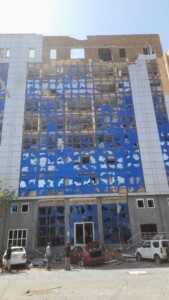FFC expects to sign agreement with military ‘soon’, but in two stages
The Forces for Freedom and Change-Central Council (FFC-CC), the mainstream FFC, announced that the agreement with the military will probably be signed soon after it had incorporated several suggestions by the military. The agreement will be signed in two stages, with many thorny issues only agreed upon in the ‘final agreement’
 Pro-democracy marches of the millions in Khartoum last month - protesters carry flags with portraits of martyrs (killed protesters) (social media)
Pro-democracy marches of the millions in Khartoum last month - protesters carry flags with portraits of martyrs (killed protesters) (social media)
The Forces for Freedom and Change-Central Council (FFC-CC), the mainstream FFC, announced that the agreement with the military will probably be signed soon after it had incorporated several suggestions by the military. The agreement will be signed in two stages, with many thorny issues only agreed upon in the 'final agreement'
In a press conference in Khartoum, the FFC-CC said that the imminent agreement is based on a two-stage political process; the preliminary ‘framework agreement’ and the ‘final agreement’. The framework agreement will likely already be signed within the next 10 days and the final agreement within a month.
The FFC explained that, after lengthy meetings, they had come to the conclusion that the framework agreement now includes the most important issues and can serve as a constitutional framework, after incorporating a number of suggestions done by the ruling military.
El Wasig El Bereir, Secretary-General of the National Umma Party (NUP) and FFC spokesperson, said that the final agreement deals with transitional justice, security and military reform, the implementation of the Juba Peace Agreement, and the dismantling of the remnants of the ousted dictatorial regime of Omar Al Bashir.
These issues are not part of the initial framework agreement. Before the final agreement is signed, the issues will be discussed with various stakeholders including "the public", he said.
El Bereir explained that the issues of justice and transitional justice will include all those affected since the coup d'état led by Al Bashir on June 30, 1989.
He further stressed the need to address the multiplicity of military institutions in Sudan and to amend the Juba Peace Agreement as it “triggered many controversies” between some groups.
Earlier this week, Radio Dabanga reported that the FFC-CC had reached an agreement with the military on roughly 80 per cent of issues. ‘Thorny and complex issues’ remained not agreed upon, however, and the FFC is critical of the military leader’s ‘political manoeuvring’.
With the two-stage agreement, it looks like those thorny issues have been postponed to future negotiations.
Two-stage agreement
Adel Khalafallah, spokesperson for a splitt-off group of the Arab Socialist Ba'ath Party, explained in the press conference that the FFC-CC alliance proposed the two-stage political process to preserve the unity of the group because members currently have different stances regarding the political process and negotiations with the military.
As mentioned, the four contentious issues are justice and transitional justice, the removal of 'empowerment'*, the Juba Peace Agreement, and military and security reform, in addition to other minor issues.
The spokesperson explained these four important issues were postponed to the final agreement, because of differing opinions among the FFC members, who now consist of a number of mainstream and split-off factions of the original partners, including the NUP, the Ba'ath Party, the Sudanese Congress Party, and new partners such as the SPLM Democratic Movement chaired by Yasir Arman.
The FFC-CC also agreed to organise a large discussion meeting on the issues of justice and transitional justice for the forces of the revolution, the resistance committees, other activists, and the Families of Protesters Killed During the Revolution group.
Khalafallah further spoke about the need to involve "the revolutionary parties in crystallising the framework for the solution and reflect their vision regarding the political agreement and constitutional charter" through broad public action.
He also explained that many party members objected to comments of the military on the draft constitutional charter developed by the Sudan Bar Association (SBA) because they would grant the prime minister wide powers, which could legalise a civilian dictator.
Former rebel leader and leading member of the FFC-CC Yasir Arman stated at the press conference that the imminent agreement with the military junta is an opportunity to end the coup and establish a democratic civil authority.
"The current political process may lead to new complications, yet they can only be resolved after the formation of the civil government," he said.
'The administration of the state is to be inseparable from the administration of the revolution' – DUP
Not part of the negotiations
The new FFC-Democratic Block, an alliance of the National Accord Forces dominated by former rebel leaders, and includes the mainstream Democratic Unionist Party (DUP), the Sudanese Ba'ath Party, and other groups, is not a party to the framework agreement between the FFC-CC and the military.
Juma El Wakeel, the bloc's spokesperson, told Radio Dabanga’s Sudan Today programme that they categorically reject any bilateral settlement between the military junta and political groups. They als reject the draft constitution of the Sudanese Bar Association as a basis for discussion. Instead, they are calling for the adoption of all drafted visions equally.
The new political alliance further rejects any amendments to the Juba Peace Agreement, signed by rebel movement members and the Sudanese government in October 2020. "The [Juba] agreement is there and should be further implemented only," El Wakeel said.
Expected failure
The Communist Party of Sudan (CPoS) expects any agreement with the military to fail and "return to square one".
Ali Babikir El Kenin, a member of the CPoS Central Committee, told Radio Dabanga that what is happening now “is a bilateral agreement between two parties and represents a return to the crisis of partnership with the military”.
“Most of the terms of the agreement are not clear and are deliberately hidden from the Sudanese people”, he said.
'Most of the terms of the agreement are not clear and are deliberately hidden from the Sudanese people' – CPoS
The party expects the non-signatory groups to be subjected to excessive repression after the final agreement has been signed, "as they will be considered hostile forces".
He also called for "judicial justice that brings criminals to trial, instead of giving guarantees that they will not be persecuted,” referring to discussions about potential impunity for military forces.
Criminal justice demand
Abdelsalam Kesha, father of a young protester killed during the demonstrations against the military junta, also declared his rejection of “any option other than criminal justice” regarding the martyrs' cases.
He told Radio Dabanga that any agreement with the military means a betrayal of the revolution. “Any agreement will not be successful as long as there are no revolutionary parties involved. We are advocates of radical change and will not be part of any upcoming agreement.”
'Transitional justice cannot be achieved without the perpetrator confessing his crimes and then asking for forgiveness' – Martyr family
The mother of another 'martyr', Amira Kabous, noted the difficulty of implementing transitional justice in the current reality of Sudan. “Transitional justice cannot be achieved without the perpetrator confessing his crimes and then asking for forgiveness.”
Human rights defender Abdelbagi Jibril refuses to grant any immunities or exemption from prosecution to any of the parties. He explained that the military’s demand for immunities means that they fear the consequences of the actions committed.
* Empowerment (tamkin) is the term with which the ousted government of Omar Al Bashir supported its affiliates by granting them far-going privileges, including government functions, the setting-up of various companies, and tax exemptions.











 and then
and then